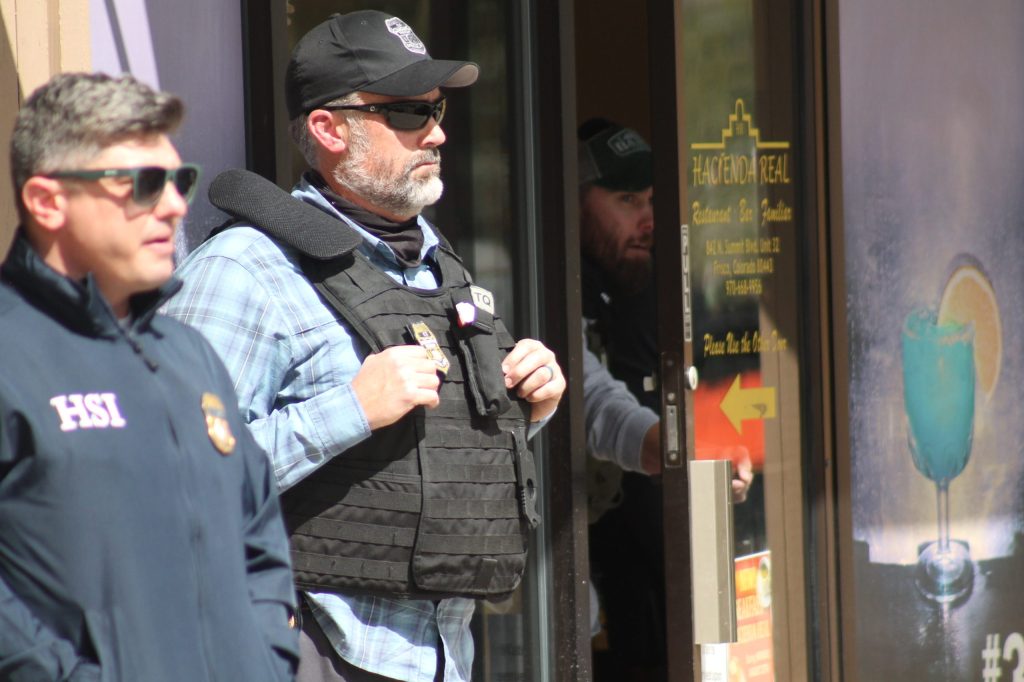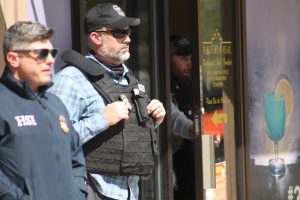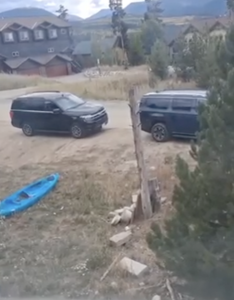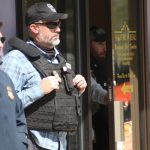In Colorado mountain towns, some sheriffs are informed of ICE operations — others are not
Sheriffs in Summit, Pitkin and Garfield counties have been alerted about raids, while those in Grand and Routt county say they haven’t

Cody Jones/Summit Daily News
As U.S. Immigration and Customs Enforcement conducts operations in Colorado mountain communities this summer, the federal agency has notified some local law enforcement agencies of its activities — but not others.
Sheriffs in Summit, Pitkin and Garfield counties said that they consider it a matter of public safety for federal law enforcement agencies to notify local authorities of operations that are planned in their jurisdictions.
“What we don’t want is a blue-on-blue incident. That’s why you would want to communicate; for that reason more than any reason,” Pitkin County Sheriff Michael Buglione said, noting that ICE has alerted his office of its operations in the county this summer.
Garfield County Sheriff Lou Vallario agreed that there is “absolutely” a public safety reason why local authorities would want to know about federal law enforcement operations going on in their jurisdictions. In an email, Vallario said that ICE has “usually” notified his office when it conducts an operation in the county.
But in Summit County, Sheriff Jaime FitzSimons said that while ICE has previously notified local law enforcement about its operations in the county, the federal agency didn’t notify his office about its operations there last week.
“This shift represents a major change, carries new risks, and requires us to adapt,” the Summit County Sheriff’s Office said in a statement.
Meanwhile, the sheriff’s offices in Grand and Routt counties have said they have no contact with ICE — including notification of operations — due to a Colorado state law that bars local law enforcement from collaborating with the federal agency.
A spokesperson for the ICE Denver Field Office did not respond to questions a reporter sent by email Friday about whether the agency has policies related to notifying local law enforcement about its operations. Instead, they provided a statement saying the federal agency is executing its mission to identify and remove those who have violated the nation’s immigration laws.
“For operational security and for the safety of our law enforcement personnel, ICE does not confirm, deny, or otherwise discuss ongoing or future operations,” the spokesperson said. “The agency publicly announces operational results when appropriate.”
‘Common courtesy’
How ICE notifies the Garfield County Sheriff’s Office of an operation can vary, according to Vallario. It can be a phone call, text or email serving as a “heads up” or a request for support “for public safety purposes,” he said.
If the sheriff’s office knows about a federal operation, Vallario said it can let members of the public who call with questions know that the operation is legitimate. If a threat to public safety should arise from the operation, he said the local sheriff’s office is also more knowledgeable about the Garfield County area.
“If we assist, it’s to let the public know that the operation is legit and legal so they have no worries,” Vallario said. “Also, if someone flees, creating a public safety issue, we usually know the locations better.”
Buglione said it is a “common courtesy” for federal agencies to notify local law enforcement of their operations. If a federal law enforcement agency is conducting an operation, he said it is important for the sheriff’s office to know so that local authorities don’t confuse federal agents for criminals.
Earlier this summer, Buglione said he met with the director of the ICE Denver Field Office, who agreed to let the Pitkin County Sheriff’s Office know about any federal operations happening in its jurisdiction.
“We agreed at least three times during that meeting that any ICE activity that takes place in Pitkin County, I will get a call or my dispatch center will get a call notifying us of the operation,” Buglione said. “As far as I know, they’ve kept that promise.”
‘Deconfliction’
For decades law enforcement agencies at every level have typically practiced “deconfliction,” according to FitzSimons, or alerting one another before conducting operations in another’s jurisdiction.
Federal agencies like ICE will issue a deconfliction notification anywhere from days to seconds before an operation begins, according to a statement from the Summit County Sheriff’s Office. The practice has “consistently produced safer outcomes for officers, deputies, and the communities they serve,” the statement reads.
“Deconfliction has always been about safety,” FitzSimons said. “When agencies know who is where and what they are doing, everyone is safer.”
When federal agents conducted operations in Frisco and Dillon Valley on Sept. 16, FitzSimons said that he was made aware of the operations through dispatch when the agents arrived.
But last week, when ICE conducted another operation in the Dillon Valley area, FitzSimons said the sheriff’s office did not receive any notification from the federal agency that it was in the county.
Local law enforcement cannot do anything to stop an ICE operation, but if they know about it, FitzSimons said they can help inform members of the public about what is going on to help ensure public safety.
“Our role, as it relates to ICE operations, is community focused. To the extent possible, we work to keep the peace and prevent escalation,” FitzSimons said. “As local law enforcement we have no legal mechanism to stop ICE operations in real time. Those checks and balances belong to lawmakers, lawyers, and the courts.”
But if local law enforcement doesn’t know that a federal agency is conducting an operation in the county, FitzSimons said his office can’t assure the public that the operation is legitimate — creating a gray area that could be exploited.
“If ICE chooses not to coordinate, the public may be left questioning who is really at their door or who is approaching them on the street,” FitzSimons said. “That opens the door for criminals to impersonate law enforcement in ways that puts everyone at risk.”
Deputies at the Summit County Sheriff’s Office and local law enforcement agencies are usually identifiable because of their uniforms and badges. FitzSimons said community members can ask to see a deputy’s identification at any time if they are uncertain.
The Summit County Sheriff’s Office enforces state laws, not federal immigration laws, and does not ask about immigration status when someone reports or is accused of a crime, FitzSimons said. State law prevents the sheriff’s office from sharing information with ICE in most situations, he said.
“We continue to encourage everyone to understand their rights,” FitzSimons said. “We are navigating this time with community safety as our foremost objective.”
No notification in Grand and Routt, sheriffs say
Despite local law enforcement in other communities sometimes receiving notification about ICE activities, the sheriff’s offices in Grand and Routt counties have said that they do not receive notification from ICE.
As reports of ICE activity swirled last week, Routt County Sheriff Doug Scherar told the public that his office could not confirm whether any federal law enforcement operations were ongoing in the county.
“Neither the Steamboat Springs Police Department nor the Routt County Sheriff’s Office can confirm these operations, as we do not have any communication with immigration enforcement officials at this time,” Scherar said in a statement at the time.
The Grand County Sheriff’s Office has said Colorado state law prevents it from working with ICE, so local authorities have not received any notification when there have been federal law enforcement activities in the county.
“It is important to clarify that due to Colorado state laws, the Grand County Sheriff’s Office is legally unable to work with, collaborate with, or support federal immigration authorities for civil immigration enforcement actions,” Grand County Sheriff’s Office Lt. Aaron Trainor wrote in a response to a records request from Sky-Hi News. “As such, it is not standard practice for Immigration and Customs Enforcement (ICE) to notify local law enforcement of their operations within our jurisdiction.”
Fraser Winter Park Police Chief Glen Trainor also said there was no communication with ICE agents around a Sept. 14 operation that detained one man in the Meadow Ridge neighborhood nearby Fraser. Sky-Hi News independently confirmed this raid through eyewitness video and the testimony of housemates and employers of Evin Gonzales, an undocumented Nicaraguan man living there.
“In accordance with the Colorado Criminal Justice Records Act, no such records exist,” he said in a statement. “Meadow Ridge is not within the Town of Fraser or Winter Park, and we don’t track incidents from outside agencies unless we are involved … I have no independent verifiable information that ICE was in town. ICE did not reach out to anyone in the Fraser Winter Park Police Department (or any other Grand County law enforcement agency that I am aware of), nor have we spoken to anyone who saw them. In other words, I have zero information other than rumors that this even happened.”

Support Local Journalism

Support Local Journalism
The Sky-Hi News strives to deliver powerful stories that spark emotion and focus on the place we live.
Over the past year, contributions from readers like you helped to fund some of our most important reporting, including coverage of the East Troublesome Fire.
If you value local journalism, consider making a contribution to our newsroom in support of the work we do.










